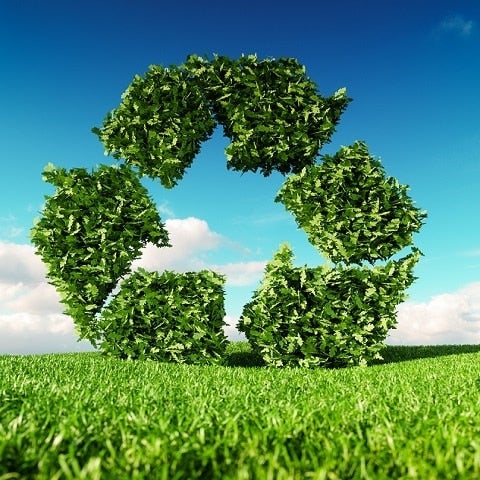At onsemi we take pride in our efforts to being sustainable in our operations as a company. Recently, onsemi was awarded the Award of Distinction by Arizona Forward, an organization devoted to sustainability progress for Arizona, for their outstanding contributions towards sustainability. As well as the Recycler of the Year – Large Business by Arizona Recycling Coalition.
onsemi has had traditional recycling programs for many years. However, as resources become scarce, available landfill space gets smaller and disposal costs continue to increase, onsemi facilities have broadened the scope of their recycling programs by thinking outside the box.
Some of the biggest recycling efforts come from the onsemi Reclamation Center (OSCR), located at onsemi headquarters in Phoenix receives all scrap manufacturing materials from our 22 factories and most subcontractors globally. The OSCR has been in operation for 40 years when it started with Motorola as a monthly auction of retired equipment and scrap manufacturing materials and it has transitioned into the efficient operation it is today. Our global reclaim objectives reflect our commitment to environmental sustainability and resource conversation while optimizing our network, protecting our intellectual property and maximizing and recapturing profits. onsemi recouped more than $29 million USD from this operation in 2018.
• In 2018, approximately 1,150,000 metric tons of scrap materials and 822 kilograms of precious metals from the OSRC were processed, sorted and sold for reuse.
• The 100,000 pounds of plastic that is shipped annually to the OSRC is burned and turned into electricity through a partnership with a local recycling company.
The success of our OSCR starts with working with subcontractors who are required to return dies (or wafers), trimmings in assembly, and rejected units from assembly and test fall-outs that are considered onsemi property. There are several benefits of centralizing the scrap collection process at our Phoenix headquarters, which include: allowing for protection of onsemi intellectual property (all destruction is witnessed by a reclamation representative and all refinery settlements are scrutinized for accuracy), all scrap is sorted to receive maximum value, scrap is consolidated into large lots for the refineries to keep refining costs down, material is distributed between multiple refineries to leverage each refiners expertise, and the centralized location eliminates duplicate activities at each location and consolidates tracking and reporting of scrap material.
The manufacturing scrap processed are separated into two categories: precious metals bearing material and non-precious metal bearing material. Precious metal bearing materials include scrapped devices, spent bead blast material, gold targets, wire and evaporator metallic, platinum targets and evaporator metallic, and printed circuit boards. Precious metals have high intrinsic value. They include gold, silver, platinum, palladium, rhodium in any form, but not limited to salts, pellets, targets, flakes and wires.
Non-precious metal bearing materials include copper and alloy 42 lead frames, plastics, stainless steel, aluminum, silicon, and copper wire and tubing. Our take-back and recycle program provides our customers with an environmentally responsible solution for the return, recycling and disposal of their products, including printed circuit evaluation boards. This program helps ensure compliance with the current and forthcoming regional regulations involving producer responsibility for the recycling and proper disposal of electronic waste products.
The goals of the OSRC are to destroy any intellectual property or branded items and recoup any costs by selling materials to refineries and bidding out recycled products, all while maintaining environmental stewardship. We use both local and national refineries and sell our cardboard to local companies. We support the Arizona economy through the partnership of local refiners and recyclers. We ensure that all our selected refiners are contracted with integrated smelters, as well as any brokers we work with have contractual agreements with integrated smelters. There are only six integrated smelters in the world that are capable of accepting electronic waste and they all run their operations strictly following environmental, health and safety policies. Refiners that do not use integrated smelters could decide to piecemeal their scrap to brokers where the waste ends up in impoverished countries like China or India where it contaminates land, water, and the air.
The OSRC works tirelessly to guarantee they are working with the best in the business. They work with our Legal and Contracts departments on all our refining agreements to ensure partnerships are compliant. With 2,477,486 pounds of scrap materials being shipped to the OSRC in Arizona a year, it is imperative to properly dispose of the waste in a manner that protects not only onsemi’s brand and revenue, but also protects the environment and communities where it is being sold.
onsemi strives to be a good, corporate citizen and to reduce our environmental impact whenever possible. Our employees play a key in this endeavor by providing innovative ideas to help us reuse, reduce and recycle. These efforts have contributed to many recognition’s onsemi has received which include Ethisphere Institute’s World’s Most Ethical Company designation for the past four years (2015-19), being named Barron’s 100 Most Sustainable Companies in 2017 and 2018 as well as becoming a member of the Dow Jones Sustainability Indices in 2018.
Learn more about onsemi’s sustainability programs in our 2018 Corporate Social Responsibility Report.
